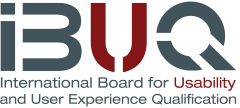Usability Engineering
These days, usability is a critical factor in the development and design of software and Internet applications. Quite often, functionality is included in software that cannot be used or used properly because the feature is either too complicated or because the user is unable to find it.
According to the International Organization for Standardization (ISO), usability is defined as the extent to which a product can be used by certain users in order to attain certain goals effectively, efficiently and satisfactorily in a specific usage context [TA08, page 4]. Consequently, the suitability for certain uses and hence the compatibility of a system within the context of usage, is defined in a specific user context.
Jakob Nielsen [93] lists the following objectives as the benchmark for the quality of user interactions with a system:
- Learnability: How easy is it for users to accomplish basic tasks the first time they encounter the design?
- Efficiency: Once users have learned the design, how quickly can they perform tasks?
- Memorability: When users return to the design after a period of not using it, how easily can they reestablish proficiency?
- Errors: How many errors do users make, how severe are these errors, and how easily can they recover from the errors?
- Satisfaction: How pleasant is it to use the design?
UXQCC
User Experience Quality Certification Center Defining Standards for User Experience and Usability Worldwide
User Experience Qualification Center (UXQCC) develops and maintains certificates for user experience and usability professionals, for companies and for products. UXQCC certifications are valued by UX organizations and companies worldwide. Continuous improvements, supervised by an international board of experts from industry and universities ensures our quality of certifications and trainings. Theoretical knowledge, practical skills and didactic excellence are combined to form one of the world´s most advanced schemes for UX education.
Please find a short overview to this certification scheme here.
The vision is to continually advance and improve the UX field by defining and maintaining a Body of Knowledge which enables UX experts to be certified.
The UXQCC Board
The UXQCC Board consists of experts from industry and academia to combine theoretical and practical knowledge. All members of the Board can be found here.
Further information can be found here.
Foundation Level (FL)
It forms the base for a today’s key qualification in the software/internet sector. The acquired knowledge assures a proficiency in definitions and basics on the human-machine-interaction and software-ergonomics.
Advanced Level (AL)
Target Group:
People and companies with a Foundation level certification, who would like dug deeper in human-machine-interaction and the process of usability engineering.
IBUQ
The IBUQ Association improves and promotes the user friendliness and utilization conveniences of interactive human-machine interfaces. Based on national and international statutes, standards and requirements, the Association develops up-to-date usability standards and conducts certification services for businesses and/or their employees.
Acquiring the basic knowledge outlined in the IBUQ syllabus will assure that fundamental insights into human patterns (e.g. perception, mental models, handling of errors) as well as the techniques required for the development of interactive systems (e.g. styles of interaction, modeling methods, dialog development) are acquired. Standards and norms as well as style guides are also included.
Included in the syllabus is the central idea of including Usability Engineering as a part of the overall development process. As such, it describes a process where usability is not only considered at certain points during development, but rather that a set of usability engineering processes must exist which include everything from requirements analyses to prototyping and specification to the implementation and evaluation as well as testing.
The foundation level of the Usability Professional certification program is of interest to all individuals and occupations involved in the topic of software or internet applications development, e.g. software developers, GUI programmers, project managers and project staff, organizers, executives, employees working for specialized departments, IT auditors and quality assurance officers. Initial development experience is a requirement. For participants to acquire eligibility to take the Usability Professional Advanced Level (Advanced Level) certification, they have to have Foundation Level certification.
The Foundation Level
Acquiring basic knowledge will assure that fundamental insights into human patterns
(e.g. perception, mental models, handling of errors) as well as the techniques required
for the development of interactive systems (e.g. styles of interaction, modeling methods,
dialog development) are acquired. Standards and norms as well as style guides are also included.
Please find the latest IBUQ Foundation Level Syllabus here.
The Advanced Level
Acquiring basic knowledge will assure that fundamental insights into human patterns
(e.g. perception, mental models, handling of errors) as well as the techniques required
for the development of interactive systems (e.g. styles of interaction, modeling methods,
dialog development) are acquired. Standards and norms as well as style guides are also included.
Exam
Both Exams, either based on the UXQCC- or the IBUQ Syllabus, are available at GASQ. The certifications are based on the respective syllabi. The exact topics covered by the exam are precisely defined in the Learning Objectives set forth in the syllabus. Consequently, the Learning Objectives provide the framework for the exams. The exam consists of multiple choice questions.
Candidates are eligible to participate in an exam either after having attended an accredited course or if they are participants of an open exam (no prior course attendance required).
However, GASQ recommends participants attend a training program with an accredited provider prior to taking the exam.

